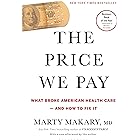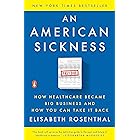| Digital List Price: | $15.19 |
| Kindle Price: | $9.99 Save $5.20 (34%) |
| Sold by: | Amazon.com Services LLC |
Your Memberships & Subscriptions

Download the free Kindle app and start reading Kindle books instantly on your smartphone, tablet, or computer - no Kindle device required.
Read instantly on your browser with Kindle for Web.
Using your mobile phone camera - scan the code below and download the Kindle app.

OK
 Audible sample Sample
Audible sample Sample 


Unaccountable: What Hospitals Won't Tell You and How Transparency Can Revolutionize Health Care Kindle Edition
Over the last ten years, quality of care remains highly variable, despite remarkable scientific progress. To patients, the healthcare system is a black box. They are unable to navigate where to go. Patients need to know more of what healthcare workers know, so they can make informed choices.
Unaccountable is a powerful, no-nonsense, non-partisan diagnosis for healing our hospitals and reforming our broken healthcare system.
- LanguageEnglish
- PublisherBloomsbury Press
- Publication dateSeptember 18, 2012
- File size4785 KB
Customers who bought this item also bought
 Blind Spots: When Medicine Gets It Wrong, and What It Means for Our HealthMarty MakaryKindle Edition
Blind Spots: When Medicine Gets It Wrong, and What It Means for Our HealthMarty MakaryKindle Edition
Editorial Reviews
Review
"This thought-provoking guide from a leader in the field is a must-read for MDs, and an eye-opener for the rest of us."
-- "Publishers Weekly"Makary's book makes it perfectly clear that data transparency not only allows people to make informed decisions about their health but also nudges hospitals and physicians to be more vigilant and efficient.-- "Booklist"
"A galvanizing book full of shocking truths about the current state of healthcare."
-- "Kirkus Reviews""Every once in a while a book comes along that rocks the foundations of an established order that's seriously in need of being shaken. The modern American hospital is that establishment and Unaccountable is that book."
-- "Shannon Brownlee, author of Overtreated"About the Author
Dr. Makary also serves as executive director of Improving Wisely, a national physician collaboration to reduce unnecessarymedical care and lower health care costs. His current research focuseson the appropriateness of medical care, administrative waste, price andquality transparency, and the impact of health care costs on low-incomepopulations.
Dr. Makary was the lead author of the originalarticles on the Surgical Checklist and later served in leadership withAtul Gawande on the World Health Organization Surgery Checklist project. Makary has published more than 250 scientific articles, includingarticles on payment reform, vulnerable populations, and opioidprescribing guidelines. He is also an advocate for treating medicalconditions when possible with healthy foods and lifestyle medicine. Dr. Makary has been named one of America's 20 most influential people inhealth care by Health Leaders magazine.
Product details
- ASIN : B008RYD43G
- Publisher : Bloomsbury Press; 1st edition (September 18, 2012)
- Publication date : September 18, 2012
- Language : English
- File size : 4785 KB
- Text-to-Speech : Enabled
- Screen Reader : Supported
- Enhanced typesetting : Enabled
- X-Ray : Enabled
- Word Wise : Enabled
- Sticky notes : On Kindle Scribe
- Print length : 257 pages
- Best Sellers Rank: #345,208 in Kindle Store (See Top 100 in Kindle Store)
- #32 in Pathology Clinical Chemistry (Kindle Store)
- #202 in Pathology Clinical Chemistry (Books)
- #1,771 in Professional & Technical
- Customer Reviews:
About the author

Dr. “Marty” Makary is a Johns Hopkins professor and NYT bestselling author. His newest book, BLIND SPOTS looks at the latest scientific research on topic that we are not talking about (that we need to talk about):
▶ The Microbiome
▶ Hormone Replacement Therapy
▶ The Peanut Allergy Epidemic
▶ Eggs (& Food)
▶ Blood tests not being ordered everyone needs
▶ Childbirth
▶ Cancer Prevention
▶ Marijuana
▶ The Culture of Medicine
▶ Medical Dogma
Dr. Makary has been a visiting professor at over 25 medical schools, has published over 250 scientific peer-reviewed articles, and has written for the Wall Street Journal, the New York Times, and the Washington Post. A public health researcher, Dr. Makary served in leadership at the World Health Organization and is a member of the National Academy of Medicine.
Dr. Makary is the recipient of the 2020 Business Book of the Year Award for his book, The Price We Pay, about the grassroots movement to lower healthcare costs through greater medical transparency. He currently leads the Evidence-based Medicine Public Policy Research Group at Johns Hopkins and is director of The Re-design of Healthcare Project, a national effort to make health care more reliable and affordable, especially for vulnerable populations. His research focuses on the appropriateness of medical care, administrative waste, and the impact of health recommendations on society. Dr. Makary is the recipient of the Nobility in Science Award from the National Pancreas Foundation and numerous teaching awards. His newest book, Blind Spots, details how to live healthy by separating medical dogma from evidence-based science.
Customer reviews
Customer Reviews, including Product Star Ratings help customers to learn more about the product and decide whether it is the right product for them.
To calculate the overall star rating and percentage breakdown by star, we don’t use a simple average. Instead, our system considers things like how recent a review is and if the reviewer bought the item on Amazon. It also analyzed reviews to verify trustworthiness.
Learn more how customers reviews work on Amazon-
Top reviews
Top reviews from the United States
There was a problem filtering reviews right now. Please try again later.
A bad fall in a blizzard sent my otherwise healthy as an Ox father into the ICU. Within days he made huge improvements that surprised the doctors. The physical therapist stated that he doesn't expect him to be with them for long because he was doing so well. The day he was to go to the recovery room my mother noticed he didn't look right. The nurse came by hourly to check on him and look at his levels to put into the computer-- but for some reason she nor any of the doctors failed to noticed that for the past 10 consecutive hours, his oxygen levels kept slipping to dangerous levels. My family asked the nurse to get a doctor because he didn't seem right (the nurse thought he looked fine) but she left and much later (after asking again for a doctor) she came back with a respiratory therapist instead. Soon my father started making weird noises. My brother in law screamed for the doctor. Next thing we know, every doctor rushed into the room and my family were kicked into the hall scared to death. What the hell just happened? He was fine last night!
Long story (not so) short: we were told his brain herniated and collapsed! No explanation as to why or how because they had no idea. They actually told me that they had never seen this happen to anyone before. What was also interesting was that every doctor that we saw every day that checked up on him every day made sure to mention to us NOW that they weren't actually his "real" doctor. At the end of that emotionally draining day (and me being in complete denial) I had no idea who his damn doctor was anymore. We requested to have a sit down with the nurse. The head RN said they would interview the young nurse for her point of view of what happened and discuss it with us, however they quickly changed their minds and didn't want to discuss anything anymore. Obviously they were concerned with protecting her. Meetings with the doctors- they told us they felt his cause of death was due to unknown factors but one in which was not related to the injury that brought him to the hospital. They were still at a total loss as to how his brain literally collapsed taking the brain stem with it. They had their "theories" of a stroke or a vasovagal attack, but those where dismissed during the independent autopsy which if anything, was a declaration of how wonderful and strong my father's health had been prior.
We were able to find an alternative neurosurgeon doctor from another state look at the reports and he was actually surprised that he saw enough information to declared negligence.
When the hospital was taken over by *** I read that all the pursuing changes they made were unacceptable to the established and experienced nurses who, in a short amount of time, all left their jobs for other hospitals. Enter the new nurses, young, inexperienced, and willing to work for what the established nurses would not. This may be an unpopular opinion but during the time when everything seemed to be looking up, I noted how all the nurses in the ICU looked like they were barely out of high school. Why would such inexperienced nurses be in the ICU working alone. I asked each one of them how old they were and how long they were working as a nurse. The average was 22 years old with less than 1 year of experience. Fact is, at that stage you are literally in the entry level stage of you career. I know enough nurses that have told me that at that age they don't have the guts to speak up to a doctor. I want to know why the nurse brought a respritory therapist when we specifically requested a doctor. I also want to know why we had to ask her two times before she brought anyone (yes she did actually left the room making us think she would bring the Dr). Even then, it was my brother in law that screamed and demanded the doctor to come. Then I want to know why she had access to my fathers vitals for the entire night and didn't notice his oxygen levels going down every hour? They won't tell us. 2 years later, we are still suffering without him and we still have so many questions. I feel like I failed him by not moving him to another hospital where I just know in my heart he would have been able to walk out of.--- So for those of you that want to give the professionals the benefit of the doubt -- don't! It's your loved ones so please speak up. Ask questions all the time. My dad came into the hospital with blood in his brain. They were aware of this. The next day the blood was less. I asked about surgery. I was told they would wait to see where it would go. Well it went into a catastrophic event. I look back and wish I begged, demanded, screamed, for them to perform a surgery on my dad. If the blood is there where does it go? His brain swole and that's what caused the herniation.
I apologize for carrying on but it's still painful and I don't want anyone to go through what we are going through. It never ends. He's been buried for 2 years but the pain never ends. --- Good luck to everyone out there and tell your family you love them. Better to be cautious than worry that your annoying the doctor.
I do believe the author did a nice job of covering a difficult subject. There are some differences and difficulties in academic and community hospitals in addressing some of the items covered, but it doesn't take away the need for transparency and on-going pursuit to raise the bar on our US Healthcare System.
Worth the money and time spent reading!









